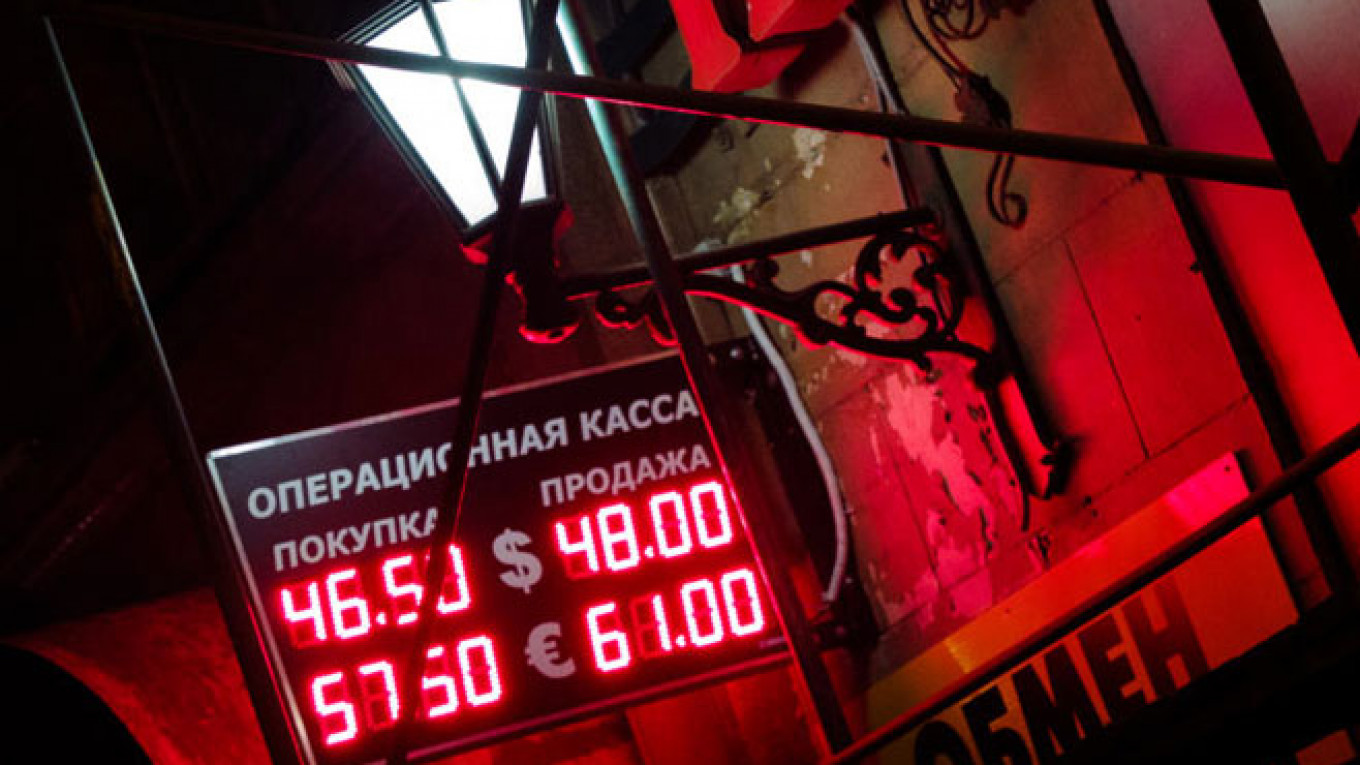The ruble — or more precisely, the ruble-dollar exchange rate — continues to dominate headlines from Russia. Last Friday the ruble hit a record low of 48 to the dollar, a 50 percent drop in value since early 2014. Later that evening, the rate rebounded somewhat, but the overall result was the same: an enormous devaluation of the Russian currency. The ruble's decline stems in part from such external "shocks" as the fall in world oil prices and Moscow's strategy in Ukraine.
One of the most interesting questions today is why the ruble has fallen so precipitously. After all, although oil prices have dropped significantly and the negative results of sanctions and counter-sanctions are obvious, Russia has not entered a recession or experienced a rise in unemployment. Do people working in financial markets know something that industrialists do not? Perhaps, but the most widespread explanation in recent days is that speculators, expecting the ruble to depreciate further, have themselves driven its value downward.
But speculating on a floating exchange rate is a risky business. Speculating on a fixed rate is different: In that case the speculator buys dollars for rubles, hoping that the Central Bank will not have enough dollars to support the rate and will eventually go bust, leaving the speculator to sell his dollars for a handsome profit. But that strategy only works if other players as well as the general public — the main player on the foreign exchange market — lose faith in the Central Bank. In fact, central banks usually maintain large currency reserves in order to set a fixed exchange rate and avoid such a scenario.
With a floating exchange rate such as Russia currently has, the speculator takes the more serious gamble that the ruble's value will continue to decline. What if the public responds too slowly? What if the balance tips in the other direction and the ruble gains against the dollar? If the exchange rate were to suddenly bounce back to 40 rubles to the dollar, it would not greatly surprise most people, but it would ruin speculators.
Some analysts recommend that the Central Bank conduct an unexpected intervention purposely to "clean out" the unwanted speculators. At the same time, no one is seriously suggesting that the Central Bank set a fixed exchange rate: The lessons of early 2014 showed the dangers of such a course under Russia's current circumstances. Now speculators see that the ruble is falling steadily, and by betting on its continued decline, they only exacerbate the problem. Some analysts argue that an intervention aimed at a rapid and temporary reversal of that trend is not expensive and would wipe out the speculators.
That is not a good idea, either with a fixed rate or a fully floating rate. The advantage of a hands-off approach is that it denies Central Bank officials any opportunity to sell what would be invaluable insider information on the plans for a sudden intervention. Even in countries with sterling reputations where corruption is rare, the existence of such plans would create temptations too great for many to resist. If Russia were to carry out such a maneuver, it would tarnish the reputation of the Central Bank. The fact is, the volatility of the exchange rate coupled with the Central Bank's sensible reluctance to struggle against it will in itself upend and ruin speculators.
So what should be done? With regard to monetary policy, not a thing. Russia's economic problems do not stem from monetary policy, and so monetary policy cannot resolve them. Then what is the larger solution? In the words of the Count of Monte Cristo: "Wait and hope." Russians will have to wait for leaders to place economic considerations as a top priority. Let's hope that happens soon.
Konstantin Sonin, a columnist for Vedomosti, is professor of economics and vice rector at the Higher School of Economics in Moscow.
A Message from The Moscow Times:
Dear readers,
We are facing unprecedented challenges. Russia's Prosecutor General's Office has designated The Moscow Times as an "undesirable" organization, criminalizing our work and putting our staff at risk of prosecution. This follows our earlier unjust labeling as a "foreign agent."
These actions are direct attempts to silence independent journalism in Russia. The authorities claim our work "discredits the decisions of the Russian leadership." We see things differently: we strive to provide accurate, unbiased reporting on Russia.
We, the journalists of The Moscow Times, refuse to be silenced. But to continue our work, we need your help.
Your support, no matter how small, makes a world of difference. If you can, please support us monthly starting from just $2. It's quick to set up, and every contribution makes a significant impact.
By supporting The Moscow Times, you're defending open, independent journalism in the face of repression. Thank you for standing with us.
Remind me later.






